.
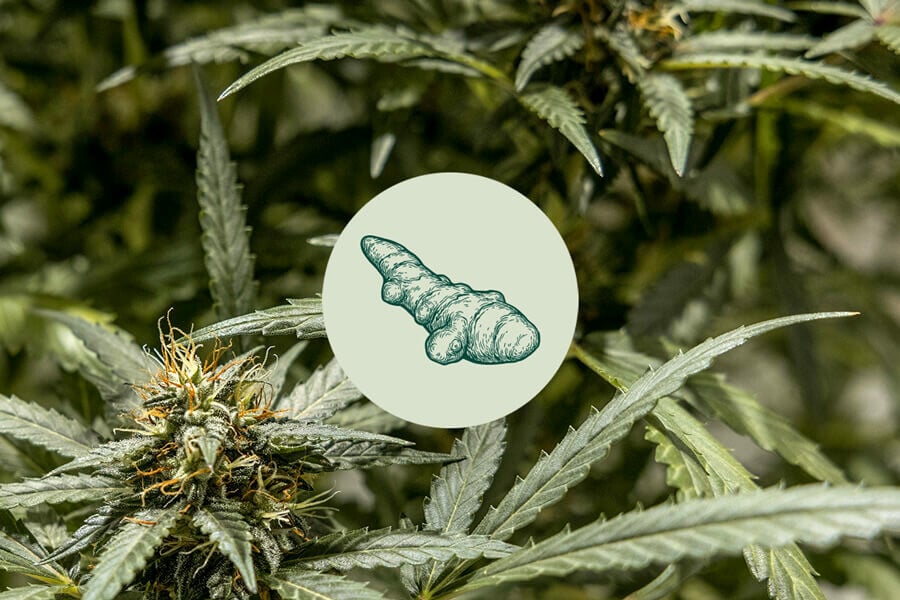
Turmeric in Organic Cannabis Cultivation: Is It Possible?
Turmeric is a natural powerhouse that fights pathogens and boosts plant health, offering a sustainable alternative to chemical pesticides. Keep reading to discover how turmeric can transform your cannabis farming practices and promote eco-friendly growing.
Contents:
In recent years, there has been a growing interest in organic cultivation thanks to increased awareness of health, environmental sustainability, and food quality. Unlike conventional agriculture, which heavily relies on synthetic chemicals, organic cultivation employs natural methods to enhance soil fertility, control pests and diseases, and produce high-quality crops. The benefits of organic cultivation include reducing chemical residues from pesticides, fertilisers, and herbicides, which lowers the risk of exposure to these harmful compounds.
Some studies[1] suggest that organic products may contain higher levels of specific nutrients, such as antioxidants, vitamins, and minerals, than conventional formulas. Specifically, organic cannabis has been shown to have a higher ratio of terpenes, which positively influence its flavour and aroma. Additionally, organic cultivation[2] improves environmental sustainability by enhancing soil structure and fertility, supporting local biodiversity, and reducing water and soil pollution.
Pest and disease control in organic cultivation is crucial for maintaining plant health and ecosystem sustainability. Unlike conventional agriculture, which depends on synthetic pesticides and fungicides, organic cultivation uses natural alternatives to manage these problems, promoting a balanced and safe agricultural environment. Among these alternatives, turmeric stands out as a natural and versatile agent[3] due to its antifungal, antibacterial, and antimicrobial properties.
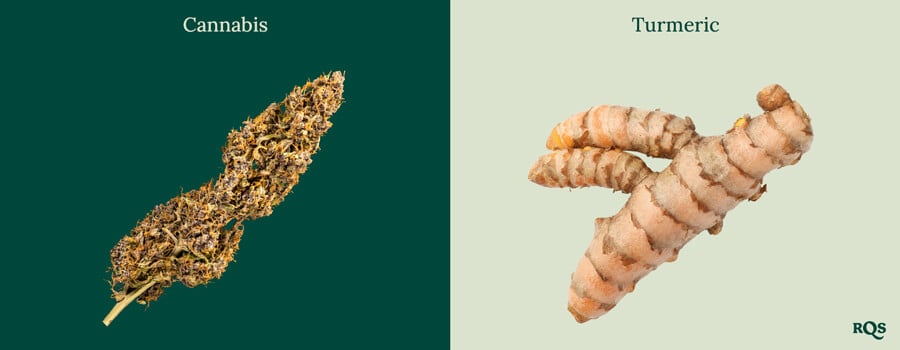
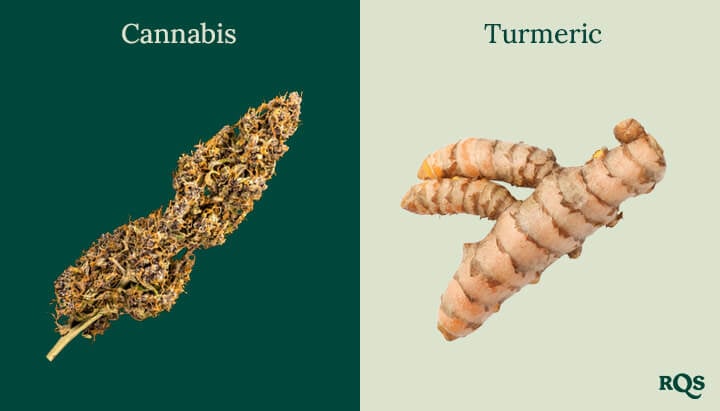
What is Turmeric?
Turmeric (Curcuma longa) is a plant with a long history of medicinal and culinary use, particularly in Asia. It has been used for millennia for its proposed wellness influence, and numerous scientific studies support turmeric's capacity as a potent agent against pathogens affecting human health.
In the culinary field, it is a well-known spice and the main component of curry in Indian and Southeast Asian cuisine. Its vibrant yellow colour and flavour make it indispensable in many dishes. Besides its use as a spice, turmeric has historically been used as a natural preservative due to its antimicrobial properties. In India, "golden milk" (a mixture of milk with turmeric and other ingredients) is a traditional drink known for its health benefits[4].
Why Use Turmeric in Organic Cultivation?
Various scientific studies have demonstrated that the main active compound in turmeric, curcumin, has potent antimicrobial, antibacterial, and antifungal properties, making it a potentially valuable tool in organic agriculture. The use of turmeric in cannabis cultivation is being explored as a natural and ecological alternative to control pathogens affecting these plants.
Compared to conventional treatments, the benefits of using turmeric in organic cultivation include:
- A natural and biodegradable product that does not generate toxic residues
- Reducing chemical residues
- Lowering the risk of exposure to harmful compounds
- Promoting healthier soil
- Conserving local biodiversity
- Decreasing water and soil pollution
Additionally, pathogens are less likely to develop resistance to curcumin due to its multiple mechanisms of action, and it is an accessible and low-cost product compared to many synthetic chemicals.
Possible disadvantages of turmeric use include:
- Curcumin concentration can vary depending on the source
- Turmeric may require more frequent applications than some synthetic pesticides
- At high concentrations, it can have phytotoxic effects on cannabis plants
However, these disadvantages can be easily managed by monitoring crops for signs of disease, adjusting turmeric applications as needed, and using optimal concentrations to maximise benefits and minimise phytotoxic effects. Moreover, turmeric can be combined with other biological and cultural practices to enhance overall effectiveness.
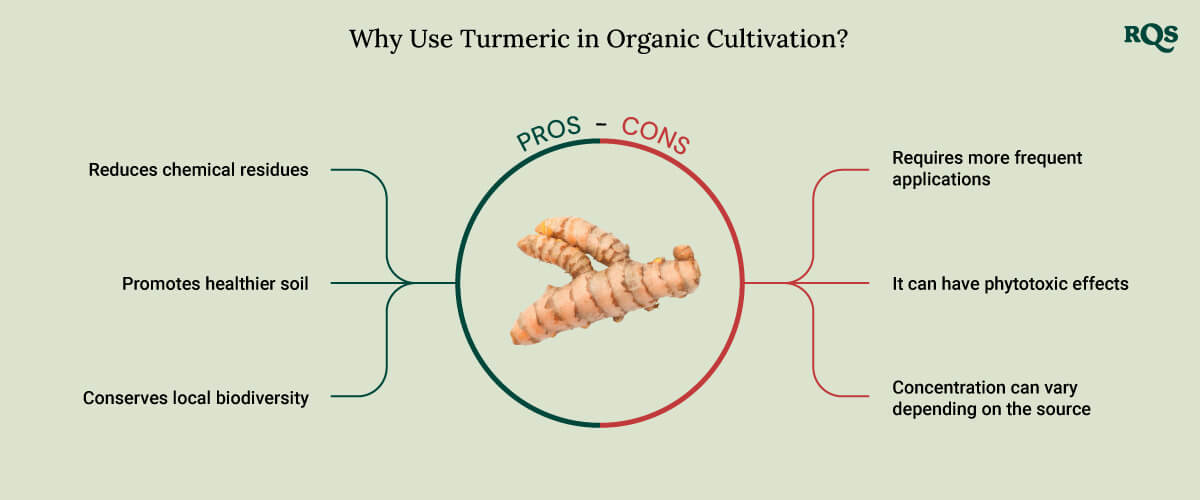
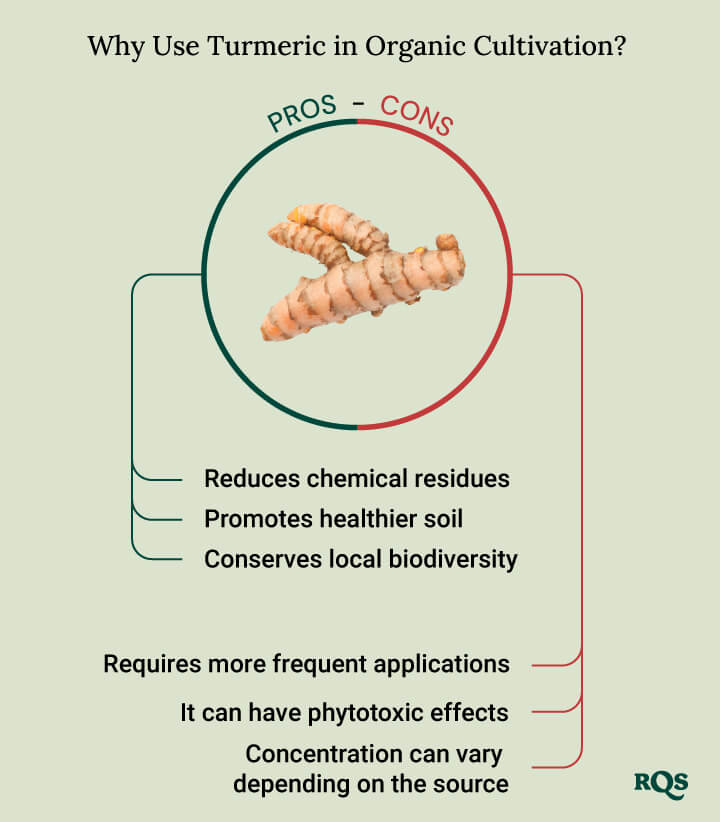
How Does Turmeric Work?
Various studies have evaluated turmeric's effectiveness under controlled conditions. These studies generally show a significant reduction in microbial load and improved plant health when turmeric is used. The studies[5] even indicate antibacterial and antifungal properties exceeding 60%. Specifically, a turmeric extract solution reduced the incidence of grey mould by 70% and infection by Pseudomonas aeruginosa by 60%.
Curcumin, the active compound in turmeric, primarily acts through several mechanisms, including:
- Disruption of cell membranes: Altering the integrity of microbial cell membranes.
- Inhibition of protein synthesis: Interfering with protein synthesis in microbial cells.
- Blocking genetic material replication: Inhibiting DNA replication in bacteria and fungi, preventing their growth.
Turmeric has shown high efficacy against a variety of bacteria, fungi, and viruses, including common pathogens that affect cannabis cultivation, such as Pseudomonas aeruginosa, Escherichia coli, Staphylococcus aureus, and fungi such as Fusarium and Botrytis cinerea, among many others. As such, applying turmeric can help reduce the incidence of grey mould (Botrytis cinerea) and wilting caused by the Fusarium fungus. Interestingly, acting through multiple mechanisms of action reduces the likelihood of microorganisms developing resistance.
Besides its antimicrobial action, turmeric can also stimulate cannabis plant growth. In field trials, growers who implemented turmeric treatments reported several improvements in crop health, including:
- Soil health improvement: Turmeric's bioactive compounds can enhance soil health, promoting nutrient absorption and beneficial microbial activity.
- Strengthening natural defences: Turmeric can induce defence responses in plants, enhancing their resistance to future pathogen attacks.
- Reduction in foliar diseases: Regular turmeric application resulted in a lower incidence of foliar diseases, reducing the need for synthetic fungicides.
Moreover, various studies[6] indicate that turmeric is emerging as a potent natural pesticide. This makes turmeric the perfect candidate for agricultural insect pest control, as it may even positively affect animals and humans consuming turmeric-treated foods.
Applications of Turmeric in Organic Agriculture
Turmeric contains several bioactive compounds, with curcumin being the most studied for its potent antibacterial properties.
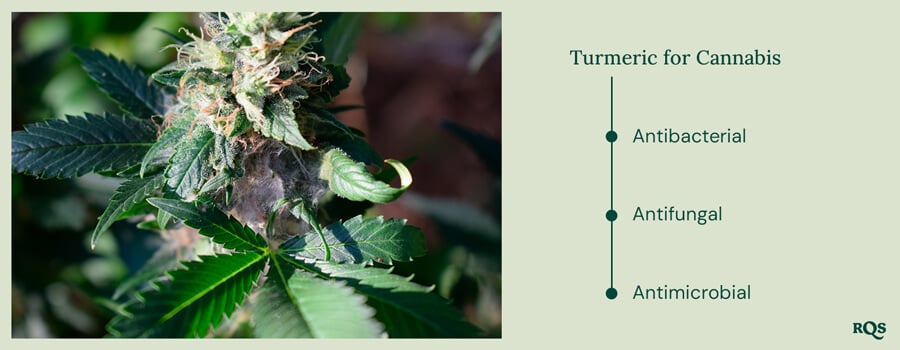
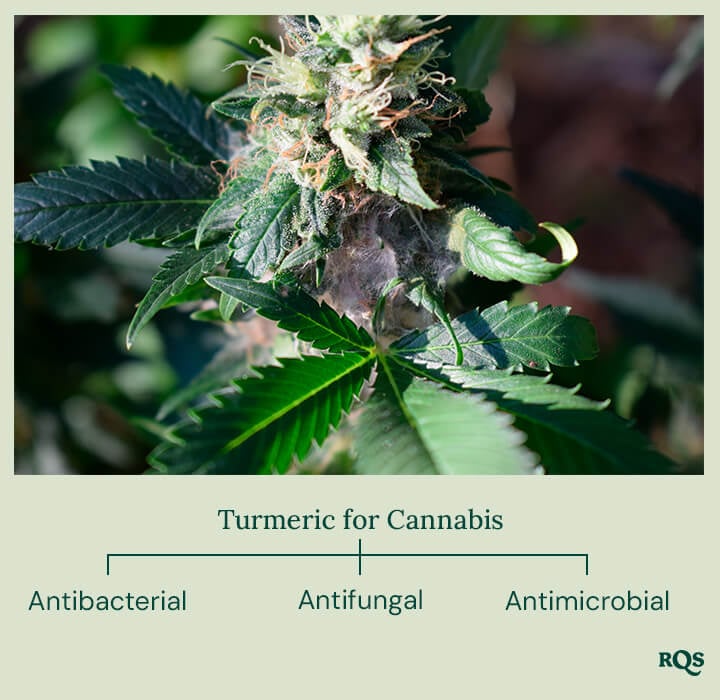
-
Use of Turmeric as an Antibacterial
Besides curcumin, turmeric includes demethoxycurcumin and bisdemethoxycurcumin, both of which contribute to its antimicrobial activity. Turmeric has shown effectiveness against various pathogenic bacteria affecting crops, including Escherichia coli, Staphylococcus aureus, and Pseudomonas aeruginosa. These pathogens cause multiple diseases that can significantly reduce crop productivity.
In cannabis cultivation, turmeric can be especially beneficial for reducing the incidence of common bacterial diseases like bacterial wilt and leaf spot. Using turmeric as an antibacterial can improve overall plant health and the quality of the final product without the adverse effects of synthetic antibiotics.
-
Use of Turmeric as an Antifungal
Turmeric has proven effective[7] against several pathogenic fungi such as Geotrichum candidum, Rhizoctonia solani, Alternaria tenuissima, Gibberella fujikuroi, Aspergillus sp., Fusarium spp., Phytophthora spp., and Botrytis cinerea. Curcumin and other turmeric compounds inhibit these fungi's growth and reproduction.
A study[8] shows that the natural components of turmeric (bisdemethoxycurcumin, calebin A, curcumin, and demethoxycurcumin) can bind to the active site of the cutinase enzyme of the pathogenic fungus Fusarium spp. This enzyme is crucial in helping the fungus penetrate plant root tissue. The results reveal turmeric's ability to alter the cutinase enzyme and its activity, interfering with the synthesis of fungal cell walls and causing cellular lysis and pathogen death.
Moreover, curcumin interferes with the synthesis of fungal cell walls, causing cellular lysis and pathogen death. By inhibiting cell wall formation, curcumin prevents fungal growth and reproduction. Another study[9] indicates that turmeric extracts can alter fungal cell membrane permeability, leading to the leakage of vital cellular components and, ultimately, fungal death. This mechanism ensures fungi cannot survive and proliferate in plants treated with turmeric.
In cannabis cultivation, turmeric can be used to control fungi such as Botrytis cinerea (grey mould) and Powdery mildew (a group of diseases caused by fungi infecting aerial parts of plants). As a result, turmeric stands as a safe and effective alternative to synthetic fungicides against these fungi.
-
Use of Turmeric as an Antimicrobial
Turmeric also contains various bioactive compounds, which possess broad-spectrum antimicrobial properties. These compounds are effective against many pathogenic bacteria, fungi, and viruses.
How to Use Turmeric in Organic Cannabis Cultivation
Turmeric could prove essential in fighting common plant-based pathogens and diseases. Below are the most accessible ways to add the herb to your grow op.
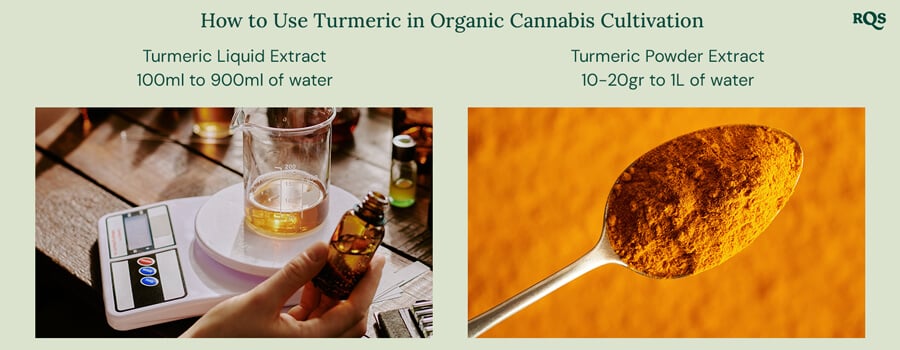
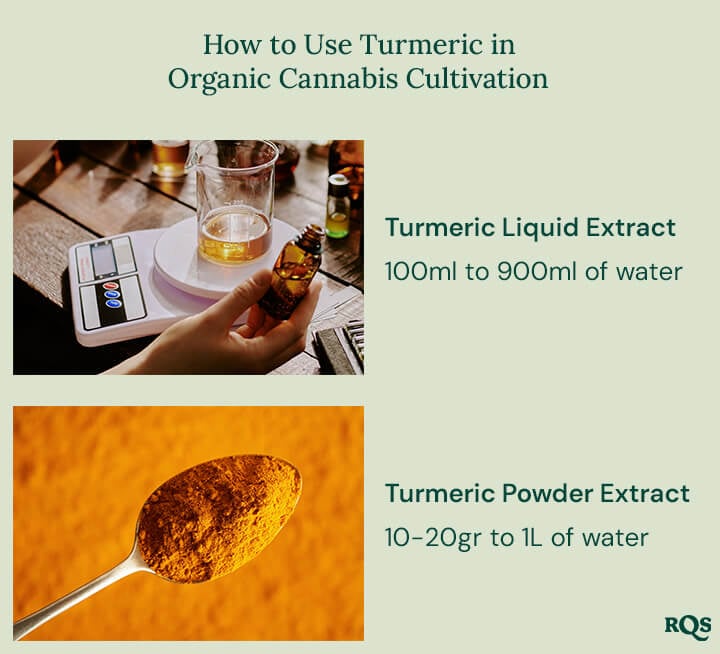
-
Preparing Extracts
-Turmeric Powder Extract: The turmeric rhizome is dried and ground. This powder can be applied directly or dissolved in water to spray plants.
-Liquid Extract: This is obtained by macerating turmeric powder in hot water, then filtering and using the resulting liquid.
-
Application Methods
Application can be done weekly or bi-weekly, depending on the severity of the infection or as a preventive measure. However, the recommended concentration of turmeric in cannabis cultivation varies depending on the method of application.
Challenges and Considerations of Using Turmeric
Currently, more research is needed to better understand turmeric's mechanisms of action and its interaction with other treatments and cultivation practices. However, biopesticide companies are exploring the development of standardised commercial formulations of turmeric for pathogen control.
These formulations are designed to be easy to apply and effective against various pathogens without harming the environment or human health. Additionally, advancements in spraying and irrigation technologies could improve the effectiveness and efficiency of turmeric application in large-scale cultivation.
Turmeric: The Next Big Hit in Organic Cannabis Cultivation?
Turmeric offers a promising natural approach to pathogen control in cannabis cultivation due to its antimicrobial, antibacterial, and antifungal properties, acting against a variety of harmful bacteria, fungi, and viruses.
Beyond these properties, using turmeric in cannabis cultivation represents a step toward more sustainable and eco-friendly agriculture. By reducing dependence on chemical pesticides, growers can lessen environmental impact and promote healthier and safer agricultural practices.
As a result, turmeric's numerous properties, ecological profile, low cost, and easy accessibility make it a natural alternative to traditional chemical treatments. With ongoing research and the integration of new technologies, turmeric could play a significant role in the future of sustainable agriculture and high-quality cannabis cultivation.
- Molecular docking and In Vitro Study Revealed the Inhibition Mechanism of Cutinase https://www.researchgate.net
- Antifungal Activity of Turmeric (Curcuma longa) Rhizome against Different Fungi https://www.researchgate.net
- A Review on Antibacterial, Antiviral, and Antifungal Activity of Curcumin - PMC https://www.ncbi.nlm.nih.gov
- Turmeric shortens lifespan in houseflies | bioRxiv https://www.biorxiv.org
- Antifungal activity of recombinant thanatin in comparison with two plant extracts https://www.researchgate.net
- Antiviral Potential of Curcumins: Ethnopharmacology, Chemistry, and Clinical Studies Focusing on Mechanism of Action and Future Perspectives | SpringerLink https://link.springer.com
- Multitargeting by turmeric, the golden spice: From kitchen to clinic - PubMed https://pubmed.ncbi.nlm.nih.gov
- Plant extracts for the control of bacterial growth: efficacy, stability and safety issues for food application - PubMed https://pubmed.ncbi.nlm.nih.gov
- Antimicrobial potential and chemical composition of Eucalyptus globulus oil in liquid and vapour phase against food https://www.sciencedirect.com
- Antifungal activity of essential oils and their potential use in food industry https://doi.org
- Chemistry, antioxidant and antimicrobial investigations on essential oil and oleoresins of Zingiber officinale - PubMed https://pubmed.ncbi.nlm.nih.gov
- Chemistry and biological activities of C. longa https://www.sciencedirect.com
- Organic agriculture https://www.tandfonline.com
- Organic agriculture in the twenty-first century - PubMed https://pubmed.ncbi.nlm.nih.gov
Categories
Grow Cannabis With RQS


























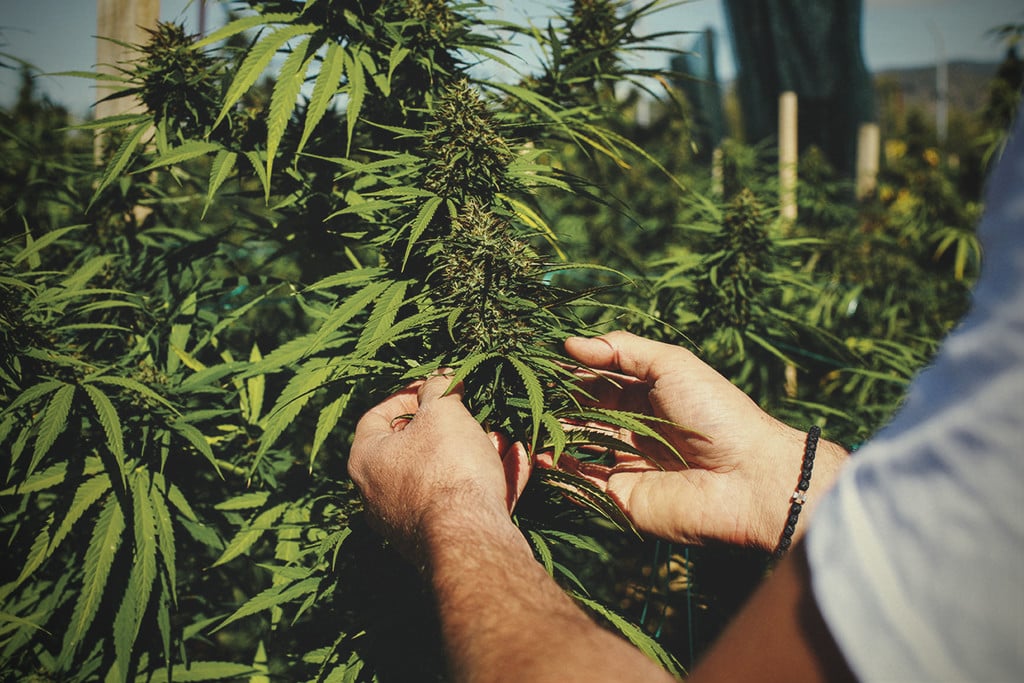
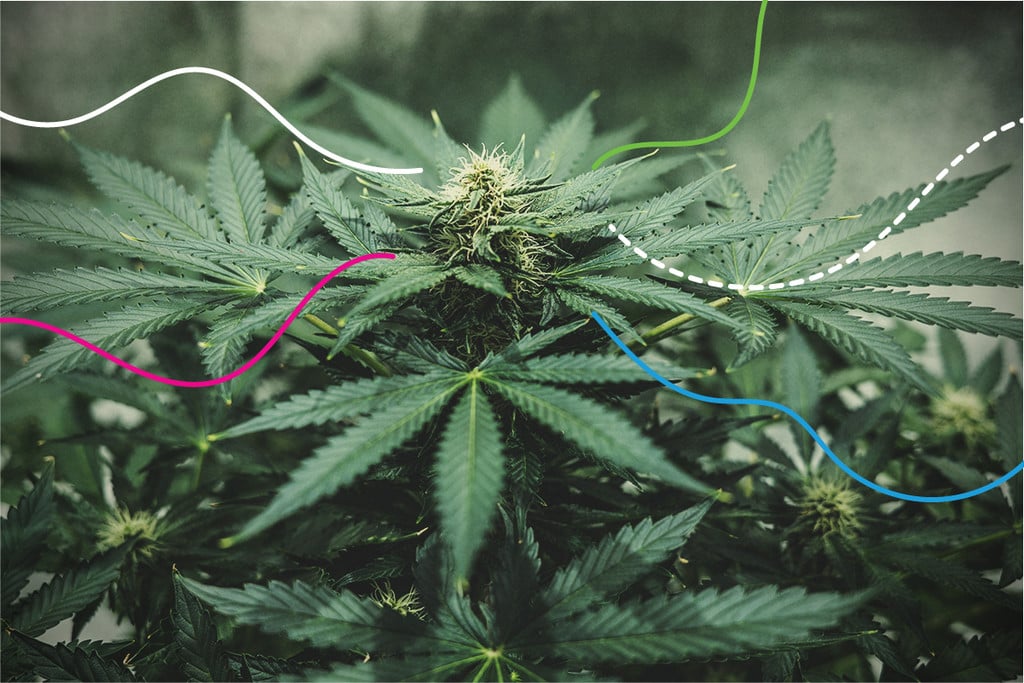

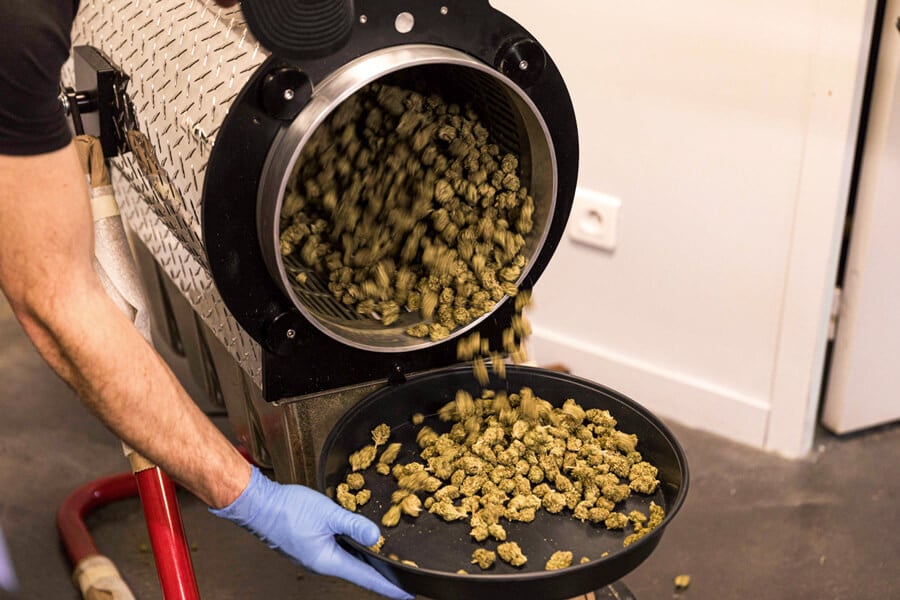
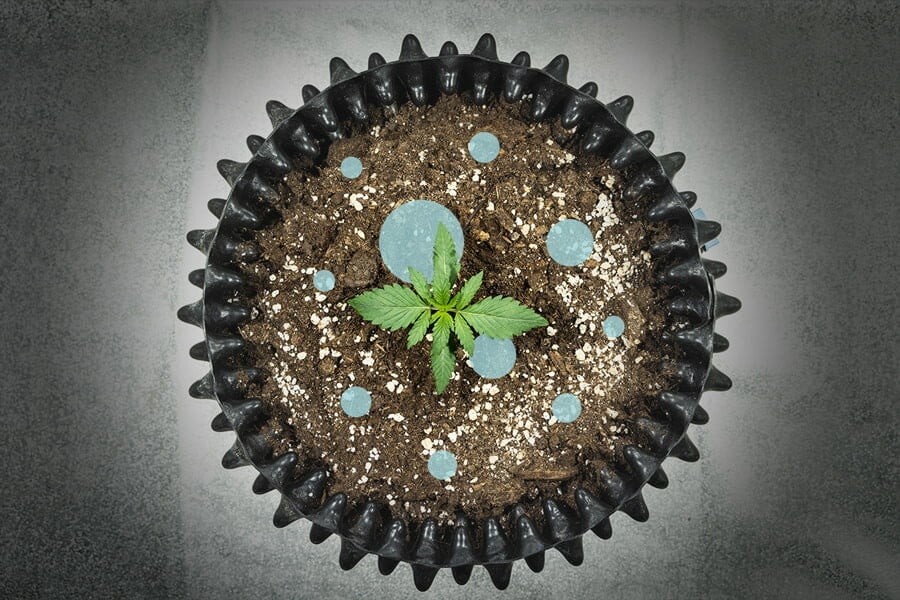
.jpg)







